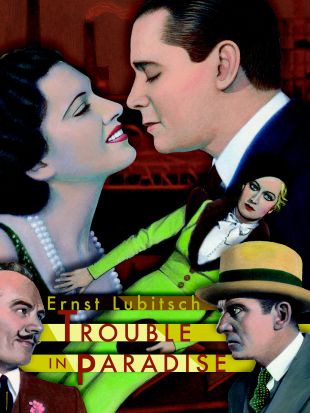The most widely imitated comic filmmaker of the sound era, Ernst Lubitsch perfected an urbane, graceful directorial style so original and so distinctive that the phrase "Lubitsch Touch" was coined simply to describe it. Combining elegance and wit to bring a tremendous warmth and humanity to even the thinnest of screenplays, he set a new standard of achievement for the light romantic comedy, largely defining the genre while also helping to revolutionize the movie musical as well as various recording techniques.
Lubitsch was born January 28, 1892, in Berlin, Germany. He first emerged as a stage performer, joining Max Reinhardt's celebrated Deutsches Theater. He made his film debut in 1912, directing Passion. Lubitsch continued to work onscreen as an actor as well, appearing in films including 1913's Die ideale Gattin and the next year's Firma Heiratet, but upon directing three separate films in 1915 alone -- Zucker und Zimt, Blindekuh, and Aufs Eis geführt, respectively -- his future behind the camera was sealed. After scoring a major hit with 1919's Die Austernprinzessin, he helmed a number of lavish historical dramas including Madame Dubarry and 1920's Anna Boleyn. Alternately, he also worked on smaller productions including the 1921 comedy Die Bergkatze, all of which proved critical to securing a market for the German film industry even prior to the rise of the Expressionist movement.
After directing over 40 films in his native land, Lubitsch was contracted by Adolph Zukor to come to Hollywood and shoot the 1923 Mary Pickford vehicle Rosita. Lubitsch decided to remain in the U.S., turning instead to the series of films which established him as a major cinematic innovator. Beginning with 1924's The Marriage Circle, the famed "Lubitsch touch" began to emerge in full as he honed a sophisticated combination of wit and understated sensuality over the course of films including Kiss Me Again, Lady Windermere's Fan, So This Is Paris, and The Student Prince in Old Heidelberg, all the while swiftly evolving into a director capable of approaching both drama and comedy with equal flair.
With the advent of the sound era, Lubitsch's career truly took flight. He became a superb musical director, excelling at seamlessly incorporating song-and-dance sequences into the fabric of the narrative (an innovation which revolutionized the genre). Lubitsch also broke new ground by filming without recording any sound, later dubbing whole scenes during post-production. The technique allowed him to shoot extreme close-ups and move his cameras at will without running the risk of any set noise, an innovation still in widespread use decades later. With the 1929 musical The Love Parade, he also launched the career of actress Jeanette MacDonald, whom he discovered in New York and cast opposite Maurice Chevalier, resulting in the beginning of one of the most legendary pairings in the annals of Hollywood.
For 1931's The Smiling Lieutenant, Lubitsch first teamed with screenwriter Samson Raphaelson, who went on to pen the scripts for many of the director's greatest efforts, including 1932's Broken Lullaby, One Hour With You (the latter co-directed by an uncredited George Cukor), and Trouble in Paradise, as well as 1934's The Merry Widow. In 1935, Lubitsch was tapped to become Paramount's new head of production, but he exited the post after just one year to return his full focus to filmmaking, resurfacing with Desire in 1936. By the end of the decade, he was regularly collaborating not only with Raphaelson but also the writing team of Charles Brackett and Billy Wilder, who scripted 1938's Bluebeard's Eighth Wife and 1939 excellent Ninotchka.
At the dawn of the 1940s, Lubitsch entered the final and arguably greatest period of his career, opening the decade with the superb Shop Around the Corner. After 1941's That Uncertain Feeling, he mounted his most famed film, the following year's To Be or Not to Be, a black comedy focusing on a Polish acting troupe's flight to freedom from Nazi oppression. Heaven Can Wait, another certified classic, appeared in 1943. Soon, however, illness began plaguing Lubitsch, and the shoots for both 1945's Royal Scandal and 1946's Cluny Brown were both hampered by his health problems. While filming 1948's That Lady in Ermine, Lubitsch suffered a heart attack and died on November 30, 1947. The movie, released posthumously, was eventually completed by Otto Preminger.
/_9by13/_derived_jpg_q90_310x470_m0/v%20%20%20%2021979.jpg)

